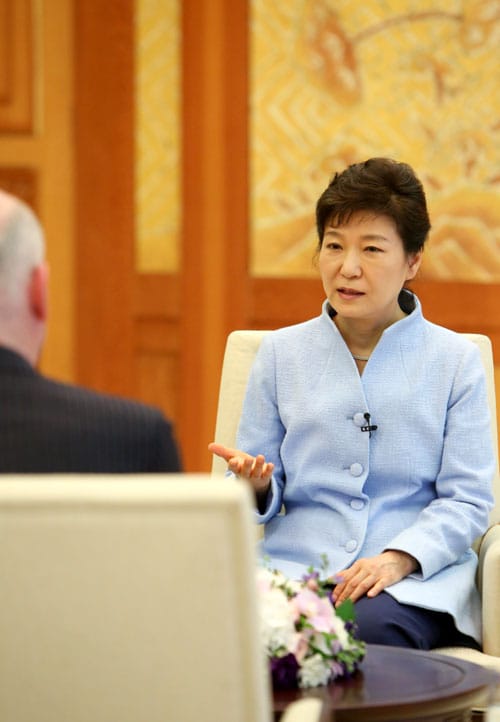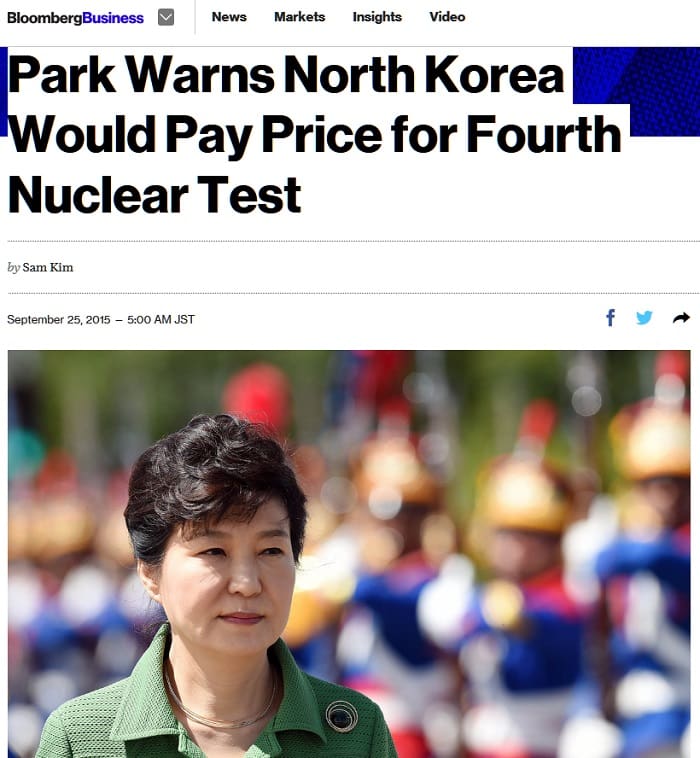
President Park Geun-hye held an interview with Bloomberg on Sept. 25 in Seoul. Pictured is the president hosting an interview with the Wall Street Journal in May 2014 at Cheong Wa Dae.
“If North Korea decides to give up its nuclear weapons program, South Korea will work with the international community to provide a range of assistance,” President Park Geun-hye pledged in written answers to Bloomberg Business on Sept. 24.
The interview took place before President Park departed Seoul on Sept. 25 to attend the United Nations Sustainable Development Summit 2015 and the 70th Session of the UN General Assembly in New York from Sept. 25 to 28.
The president also warned that, “Should the North go ahead with provocative actions that violate U.N. Security Council resolutions, there will certainly be a price to be paid.” The South Korean government is making every diplomatic effort to prevent the North from further belligerence, she stressed, by working closely with the international community, including the U.S.
Concerning a potential trilateral summit between Korea, China and Japan, expected in October or November, the president said that, “Such a meeting would offer an opportunity for leaders of the three nations to get a better grasp of developments in the North and other issues, and find more common ground in pushing back against the North Korean nuclear challenge.”
President Park said that she would make particular efforts to lay the groundwork for a peaceful unification of Korea and implement reforms essential to improving the nation’s competitiveness during the remainder of her tenure.
She said that unification of the peninsula would be one way to address what she called Korea’s major structural crisis: an aging population and a low birthrate.

Bloomberg Business interviews President Park Geun-hye on Sept. 24 in Seoul.
The president also spoke cautiously about Japan, which recently passed legislation allowing the country to send troops overseas to fight alongside its allies. “The Japanese government would do well to duly take into account the sense of unease inside and outside Japan in relation to the recently-passed defense and security legislation. Adopting an expanded interpretation of this legislation ought to be avoided,” she added.
Finally, the president called for stronger economic ties between Korea and Japan, as she emphasized that, “The two countries must move forward on the basis of mutual trust. A decline in bilateral trade is in the interest of neither country. Going forward, we will continue to make efforts to expand our bilateral economic partnership by reinforcing mutually beneficial relations through greater two-way investment and joint entry into third country markets.”
By Wi Tack-whan, Sohn JiAe
Korea.net Staff Writers
whan23@korea.kr























